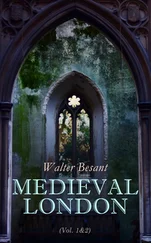Walter Besant - London
Здесь есть возможность читать онлайн «Walter Besant - London» — ознакомительный отрывок электронной книги совершенно бесплатно, а после прочтения отрывка купить полную версию. В некоторых случаях можно слушать аудио, скачать через торрент в формате fb2 и присутствует краткое содержание. Жанр: foreign_antique, foreign_prose, на английском языке. Описание произведения, (предисловие) а так же отзывы посетителей доступны на портале библиотеки ЛибКат.
- Название:London
- Автор:
- Жанр:
- Год:неизвестен
- ISBN:нет данных
- Рейтинг книги:4 / 5. Голосов: 1
-
Избранное:Добавить в избранное
- Отзывы:
-
Ваша оценка:
- 80
- 1
- 2
- 3
- 4
- 5
London: краткое содержание, описание и аннотация
Предлагаем к чтению аннотацию, описание, краткое содержание или предисловие (зависит от того, что написал сам автор книги «London»). Если вы не нашли необходимую информацию о книге — напишите в комментариях, мы постараемся отыскать её.
London — читать онлайн ознакомительный отрывок
Ниже представлен текст книги, разбитый по страницам. Система сохранения места последней прочитанной страницы, позволяет с удобством читать онлайн бесплатно книгу «London», без необходимости каждый раз заново искать на чём Вы остановились. Поставьте закладку, и сможете в любой момент перейти на страницу, на которой закончили чтение.
Интервал:
Закладка:
Compare the conquest of London by the men of Essex with that of Jerusalem by Titus. The latter conqueror utterly destroyed the city, and drove out its people. One might have expected the silence of Silchester or Pevensey. No, the people crept back by degrees; the old traditions remained and still remain. Behind the monkish sites are those familiar to the common people. Here is the old place of execution – the monks knew nothing of that – here is the valley of Hinnom; here that of Kedron. These memories have not died. But of the old Augusta nothing at all remains. Not a single tradition was preserved by the scanty remnant of slaves which survived the conquest; not a single name survives. All the streets have been renamed – nay, their very course has been changed. The literature of the City, which, like Bordeaux, had its poets and its schools of rhetoric, has disappeared; it has vanished as completely as that of Carthage. All the memories of four hundred years have gone; there is nothing left but a few fragments of the old wall, and these seem to contain but little of the Roman work: an old bath, part of the course of an ancient street, and the fragment which we call London Stone. Perhaps some portions of the Roman river-wall have been unearthed, but this is uncertain.
One fact alone has been considered to suggest that some of the old Roman buildings remained and were used again for their old purposes.
In the oldest part of the City, that which lies along the river-bank, the churches are mostly dedicated to the apostles. Those which stand farther inland are dedicated to local and later saints – St. Dunstan, St. Botolph, St. Osyth, St. Ethelburga, for instance. But among those along the river are the churches of St. Peter, St. Paul, St. Mary, St. Stephen, St. Michael. It is therefore suggested, but with hesitation, that when the East Saxons took possession they found the Roman basilicas still standing; that when they became converted they learned the original purpose of their churches and the meaning of the emblems; that they proceeded to rebuild them, preserving their dedications, and made them their own churches. This may be so, but I do not think it at all likely. It is possible, I say, but not probable.
You have heard the story how Augusta disappeared, and how the East Saxons found it deserted, and how London was born, not the daughter of Augusta at all. Augusta was childless.
The principal Roman buildings consisted of a bridge, a wall, a fort at either end of this bridge, and two ports – Queenhithe and Billingsgate. No one knows when the bridge was built: the wall was not erected until some time between A.D. 350 and A.D. 369. At that time the area enclosed by the wall was covered with villas and gardens. The wall has been traced with certainty, and portions either of the original wall or the mediæval repairs have been found in many places, and may still be seen above-ground. The Roman remains which have been dug up consist of mosaic pavements, sepulchral cists, keys, toilet articles, lamps, fibulæ, amphoræ, domestic things, and a few bronze statuettes. Nothing whatever has been found to show that Augusta was ever a great city, in the sense that Massilia, Ephesus, Bordeaux, or Alexandria was great.
II
SAXON AND NORMAN
The citizens of New London – Augusta having thus perished – were from the outset a people of mixed race. But the Saxons, and especially the East Saxons, prevailed. Strangely, it is Essex which has always prevailed in London. The modern Cockney dialect, which says "laidy" and "baiby" for lady and baby, and "whoy" and "hoigh" for why and high, is pure Essex: you can hear it spoken all over the country districts of that little-visited county: it is a dialect so strong that it destroys all other fashions of speech, even the burr of Cumberland and the broad drawl of Devonshire. Saxon London was mainly East Saxon. But, besides the new owners of London, there was, first of all, some remnant of the scattered Welsh. I do not mean the miserable survivors of Augustan London, found in the place when it was first entered, but those Britons who had taken refuge in the forests of Surrey, Sussex, and Middlesex, and there lived as they could, until they could safely venture forth among their conquerors. Gildas, as we have seen, speaks of these people; and their skulls remain in the Saxon cemeteries to prove how great a Celtic element survived among the English conquerors. Next, there were the foreign merchants. This class formed a considerable proportion of the better class; and it grew larger every day, because the East Saxon was certainly not so sharp in affairs as the "man of Rouen;" nor was he in business capacity equal to the Fleming and the German. But as happens, mutatis mutandis , at the present day, those who were Flemings and the men of Rouen, speaking their own language, under Ethelred, had all become Londoners, speaking the English tongue, under Henry Beauclerk.
It was, indeed, a complete revolution in his manners and customs for the East Saxon when he exchanged his village community for a walled town. Consider: at first he lived retired in the country, farming and cattle-breeding, banded with other families for safety; he kept up the customs of his fatherland, he carried on no trade, he suffered the old towns to fall into ruin; his kinglet had no capital, but roamed about from place to place, administering justice in the royal wagon; he enjoyed a ferocious and blood-thirsty religion suiting his savage disposition; he knew only the simplest arts; he could till the ground, grind his corn, brew beer and mead, and work a little in metals; his women could spin; he knew no letters; he looked for nothing better than ever-recurring war, with intervals of peace and feasting; to die on a battle-field was an enviable lot, because it carried him away to everlasting happiness. Look at the same man four hundred years later. He is now a Christian; he is, in a way, a scholar; he is an architect, an artist, an illuminator, a musician, a law-maker, a diplomatist, an artificer, a caster of bells, a worker in gold and silver; he carries on fisheries; he is a merchant; he builds ships; he founds trade-guilds – he is as far removed from the fierce warrior who leaped ashore at Thanet as the Romano-Briton whom he conquered was removed from the naked savage who opposed the arms of Cæsar.
The difference is chiefly due to his conversion. This has brought him under the influence of Rome Ecclesiastic. It has educated him, turned him into a townsman, and made growth possible for him. No growth is possible for any race until it first accepts the creed of civilization.
London was converted in A.D. 604. This was a hasty and incomplete conversion, executed to order; for the citizens speedily relapsed. Then they were again converted, and in sober earnest put away their old gods, keeping only a few of the more favorite superstitions; some of these remain still with us. They were so thoroughly converted that the city of London become a veritable mother of saints. There was the venerable Erkenwald, saint and bishop, he who built Bishopsgate on the site of the old Roman gate. There was St. Ethelburga, the wife of Sebert, the first Christian king; her church still stands, though not the earliest building, close beside the site of the old gate. There was St. Osyth, queen and martyr, the mother of King Offa; her name also survives in Size, or St. Osyth's, Lane, but the Church of St. Osyth was rededicated to St. Ben'et Sherehog (Benedict Skin-the-Pig); you may see the little old church-yard still, black and grimy, surrounded on three sides by tall houses. English piety loved to dedicate churches to English saints – more likely these than Italian or French – to look after the national interests. Thus there were in London churches dedicated to St. Dunstan, St. Swithin, St. Botolph (whose affection for the citizens was so well known that it was recognized by four churches), St. Edmund the Martyr, and, later on, when the Danes got their turn, churches to St. Olaf and St. Magnus.
Читать дальшеИнтервал:
Закладка:
Похожие книги на «London»
Представляем Вашему вниманию похожие книги на «London» списком для выбора. Мы отобрали схожую по названию и смыслу литературу в надежде предоставить читателям больше вариантов отыскать новые, интересные, ещё непрочитанные произведения.
Обсуждение, отзывы о книге «London» и просто собственные мнения читателей. Оставьте ваши комментарии, напишите, что Вы думаете о произведении, его смысле или главных героях. Укажите что конкретно понравилось, а что нет, и почему Вы так считаете.












